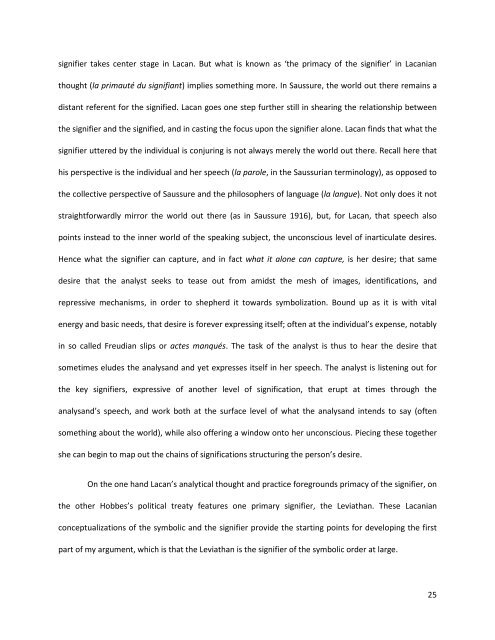1 Theorising Agency in International Relations In Hobbes's Wake ...
1 Theorising Agency in International Relations In Hobbes's Wake ...
1 Theorising Agency in International Relations In Hobbes's Wake ...
You also want an ePaper? Increase the reach of your titles
YUMPU automatically turns print PDFs into web optimized ePapers that Google loves.
signifier takes center stage <strong>in</strong> Lacan. But what is known as ‘the primacy of the signifier’ <strong>in</strong> Lacanian<br />
thought (la primauté du signifiant) implies someth<strong>in</strong>g more. <strong>In</strong> Saussure, the world out there rema<strong>in</strong>s a<br />
distant referent for the signified. Lacan goes one step further still <strong>in</strong> shear<strong>in</strong>g the relationship between<br />
the signifier and the signified, and <strong>in</strong> cast<strong>in</strong>g the focus upon the signifier alone. Lacan f<strong>in</strong>ds that what the<br />
signifier uttered by the <strong>in</strong>dividual is conjur<strong>in</strong>g is not always merely the world out there. Recall here that<br />
his perspective is the <strong>in</strong>dividual and her speech (la parole, <strong>in</strong> the Saussurian term<strong>in</strong>ology), as opposed to<br />
the collective perspective of Saussure and the philosophers of language (la langue). Not only does it not<br />
straightforwardly mirror the world out there (as <strong>in</strong> Saussure 1916), but, for Lacan, that speech also<br />
po<strong>in</strong>ts <strong>in</strong>stead to the <strong>in</strong>ner world of the speak<strong>in</strong>g subject, the unconscious level of <strong>in</strong>articulate desires.<br />
Hence what the signifier can capture, and <strong>in</strong> fact what it alone can capture, is her desire; that same<br />
desire that the analyst seeks to tease out from amidst the mesh of images, identifications, and<br />
repressive mechanisms, <strong>in</strong> order to shepherd it towards symbolization. Bound up as it is with vital<br />
energy and basic needs, that desire is forever express<strong>in</strong>g itself; often at the <strong>in</strong>dividual’s expense, notably<br />
<strong>in</strong> so called Freudian slips or actes manqués. The task of the analyst is thus to hear the desire that<br />
sometimes eludes the analysand and yet expresses itself <strong>in</strong> her speech. The analyst is listen<strong>in</strong>g out for<br />
the key signifiers, expressive of another level of signification, that erupt at times through the<br />
analysand’s speech, and work both at the surface level of what the analysand <strong>in</strong>tends to say (often<br />
someth<strong>in</strong>g about the world), while also offer<strong>in</strong>g a w<strong>in</strong>dow onto her unconscious. Piec<strong>in</strong>g these together<br />
she can beg<strong>in</strong> to map out the cha<strong>in</strong>s of significations structur<strong>in</strong>g the person’s desire.<br />
On the one hand Lacan’s analytical thought and practice foregrounds primacy of the signifier, on<br />
the other Hobbes’s political treaty features one primary signifier, the Leviathan. These Lacanian<br />
conceptualizations of the symbolic and the signifier provide the start<strong>in</strong>g po<strong>in</strong>ts for develop<strong>in</strong>g the first<br />
part of my argument, which is that the Leviathan is the signifier of the symbolic order at large.<br />
25
















